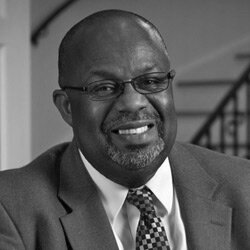NC likely won’t play big role if primary delayed
Duke political scientists talk to media about effect of Scalia’s death, likely primary outcomes
| by Steve Hartsoe
North Carolina will play a lesser role in selecting presidential candidates if the March 15 primary is moved to May or early summer because of legal wrangling over redistricting.
That’s the view of a pair of Duke political scientists who spoke Tuesday to local reporters about the election in an event sponsored by Duke’s Campaign Stop 2016.
The death of Supreme Court justice Antonin Scalia over the weekend will delay a final ruling on the state’s congressional district maps, participants said. Scalia’s vote was needed to break a potential 4-4 deadlock and defeat a lower court’s ruling against GOP-drawn redistricting maps.
“The death of Scalia has changed the dynamic,” said Kerry Haynie, an associate professor of political science.
By the time North Carolina voters get to select their nominee for president, two candidates will likely have sewn up the nomination, added David Rohde, a professor of political science.
“I expect a nominee from both parties in six to eight weeks,” Rohde said. That is, barring any unseen wrenches thrown into the race, such as Vice President Joe Biden changing his mind and deciding to run, or Hillary Clinton getting indicted, Rohde said.
If no such major changes occur and the N.C. primary is held in May or later, then Rohde doesn’t believe the state primary will have much relevance in winnowing out the field of presidential nominees.
“I expect it to be decided before then,” he said, adding that 60 percent of Republican delegates will be decided by March 15. “It’s a big chunk.”
Haynie called 2016 a “big, big year for North Carolina politics,” citing the race for governor and U.S. Senate in addition to the next president. He said incumbent Republican Gov. Pat McCrory is “vulnerable” in part because of the state’s economy.
He said he believes North Carolina will remain a factor in how the primary elections turn out, even though the presidential race will have “taken some shape” by the time North Carolina holds its primary.
Even so, he said, “It will be a dog fight until the time of the convention.”
Haynie expects Hillary Clinton to win the Democratic nomination. He called Republican frontrunner Donald Trump’s success “a mystery” that a political scientist can’t explain. But he believes Sen. Ted Cruz will likely get the GOP nomination, thanks in large part to the abundance of right-wing voters in the South.
Haynie and Rohde said the death of Scalia has raised the stakes in the election, making voters more aware that the president nominates a justice to the Supreme Court.
One fallout from the loss of Scalia could be that Democrats rally around Clinton to assure the election of a Democratic president who will appoint the next justice, Haynie said.
This includes supporters of Sen. Bernie Sanders. “The safer bet may be behind Hillary Clinton to win in November,” Haynie said.
The same sense of urgency regarding the magnitude of the next president’s impact on the high court could also influence Republicans, Haynie added.
They realize they could not only lose the presidency, they could lose the Supreme Court, he said.
Republicans have said they will not confirm any Supreme Court nominee President Obama puts forth. Rohde said that position is indicative of today’s polarized political world – regardless of how the Senate handled past nominations by a president from the other party.
Rohde said “no candidate exists on the face of the Earth” that the Republicans would confirm if nominated by Obama, adding: “The Republican position is that the only thing that matters here is the party of the nominator.”
Also, listen to Professor Haynie on “The State of Things.”
Want to stay informed on the go? Subscribe to our newsletter, This Week's 5 Gems. It's a curated digest of the week's top five stories delivered straight to your inbox.
David Rohde
Professor of political science; director of the Political Institutions and Public Choice Program
Expertise: American Politics, Politics and Public Policy
He specializes in American politics, including campaigns and elections, and legislative politics. Rohde is a member of the American Academy of Arts and Sciences, author of "Parties and Leaders in the Post-Reform House" and co-author of a series of books on every national election since 1980.
More InfoKerry Haynie
Associate professor of political science and African and African-American Studies; director of the Center for the Study of Race, Ethnicity, and Gender in the Social Sciences
Expertise: North Carolina and the South, Politics and Public Policy, Race, Ethnicity and Gender
His research and teaching interests are in race and ethnic politics, legislative processes, state-level politics, Southern politics and comparative urban politics.
More Info


